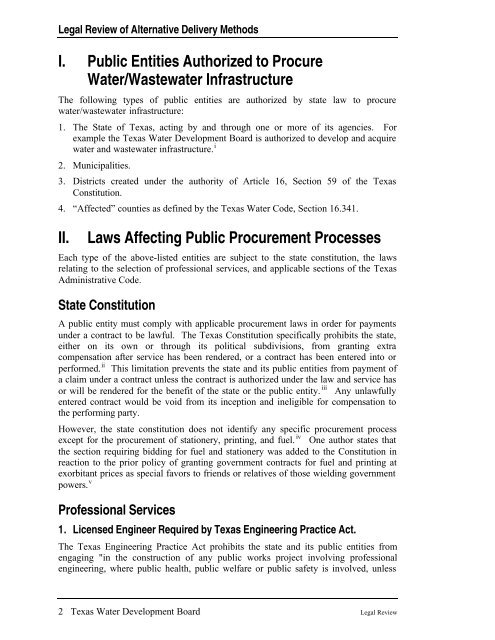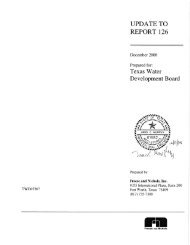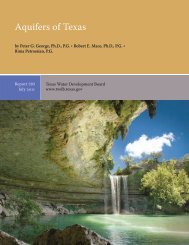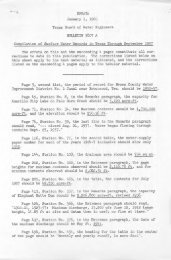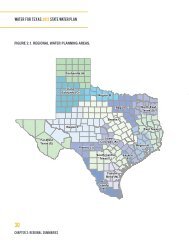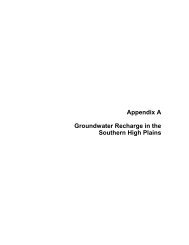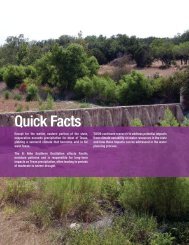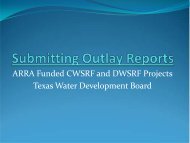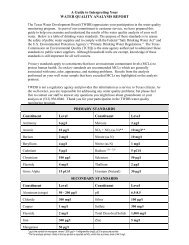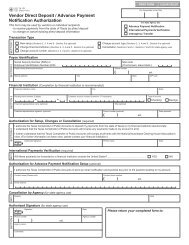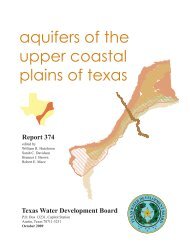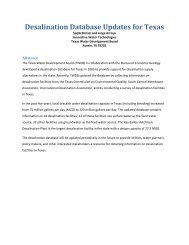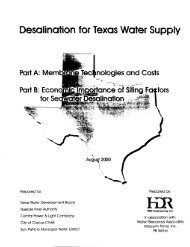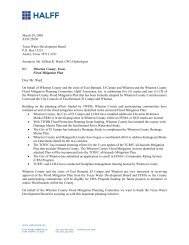Alternative Project Delivery - Texas Water Development Board
Alternative Project Delivery - Texas Water Development Board
Alternative Project Delivery - Texas Water Development Board
Create successful ePaper yourself
Turn your PDF publications into a flip-book with our unique Google optimized e-Paper software.
Legal Review of <strong>Alternative</strong> <strong>Delivery</strong> Methods<br />
I. Public Entities Authorized to Procure<br />
<strong>Water</strong>/Wastewater Infrastructure<br />
The following types of public entities are authorized by state law to procure<br />
water/wastewater infrastructure:<br />
1. The State of <strong>Texas</strong>, acting by and through one or more of its agencies. For<br />
example the <strong>Texas</strong> <strong>Water</strong> <strong>Development</strong> <strong>Board</strong> is authorized to develop and acquire<br />
water and wastewater infrastructure. i<br />
2. Municipalities.<br />
3. Districts created under the authority of Article 16, Section 59 of the <strong>Texas</strong><br />
Constitution.<br />
4. “Affected” counties as defined by the <strong>Texas</strong> <strong>Water</strong> Code, Section 16.341.<br />
II.<br />
Laws Affecting Public Procurement Processes<br />
Each type of the above-listed entities are subject to the state constitution, the laws<br />
relating to the selection of professional services, and applicable sections of the <strong>Texas</strong><br />
Administrative Code.<br />
State Constitution<br />
A public entity must comply with applicable procurement laws in order for payments<br />
under a contract to be lawful. The <strong>Texas</strong> Constitution specifically prohibits the state,<br />
either on its own or through its political subdivisions, from granting extra<br />
compensation after service has been rendered, or a contract has been entered into or<br />
performed. ii This limitation prevents the state and its public entities from payment of<br />
a claim under a contract unless the contract is authorized under the law and service has<br />
or will be rendered for the benefit of the state or the public entity. iii Any unlawfully<br />
entered contract would be void from its inception and ineligible for compensation to<br />
the performing party.<br />
However, the state constitution does not identify any specific procurement process<br />
except for the procurement of stationery, printing, and fuel. iv One author states that<br />
the section requiring bidding for fuel and stationery was added to the Constitution in<br />
reaction to the prior policy of granting government contracts for fuel and printing at<br />
exorbitant prices as special favors to friends or relatives of those wielding government<br />
powers. v<br />
Professional Services<br />
1. Licensed Engineer Required by <strong>Texas</strong> Engineering Practice Act.<br />
The <strong>Texas</strong> Engineering Practice Act prohibits the state and its public entities from<br />
engaging "in the construction of any public works project involving professional<br />
engineering, where public health, public welfare or public safety is involved, unless<br />
2 <strong>Texas</strong> <strong>Water</strong> <strong>Development</strong> <strong>Board</strong> Legal Review


